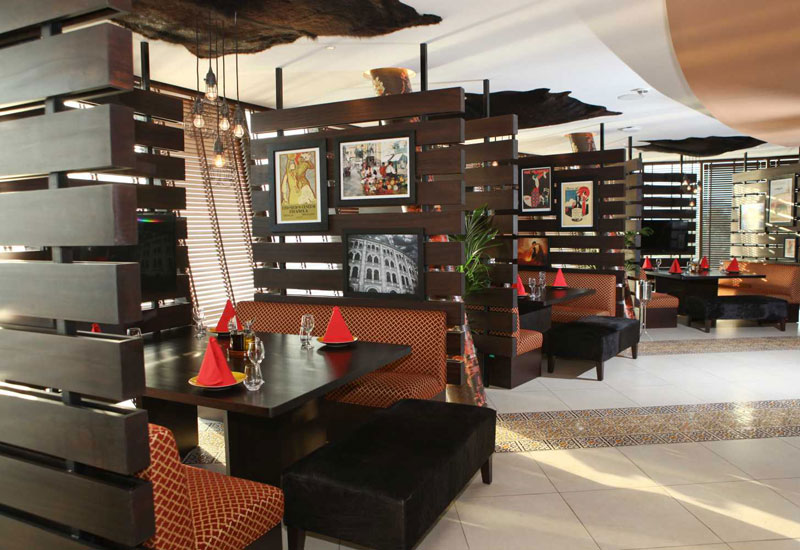 The interiors of Casa de Tapas, which is one of the latest ventures by Whissle Group, is located at the Dubai Creek Golf & Yacht Club.
The interiors of Casa de Tapas, which is one of the latest ventures by Whissle Group, is located at the Dubai Creek Golf & Yacht Club.
Fresh flavours and a healthy perception are driving a craze in the region for Spanish cuisine. Hannah Kassam explores the highs and lows of being on the delivering end
Meet the Experts
- Jose Vicente Jorge, executive chef, Seville’s
- Alvaro Roa, chef, Salero Tapas & Bodega
- Saurabh Tiwari, F&B manager, Meliá Dubai
- Luis Manuel Ezqueta Figueroa, chef, Casa de Tapas
- Juan Carlos, chef, El Sur
Do you think Spanish food is popular in the Middle East? Jose Vicente Jorge, executive chef, Seville’s: When I first came to Dubai, there were only two Spanish restaurants, and one or two more were doing some kind of Spanish tapas, but not really.

| Advertisement |
And now the number of Spanish restaurants and chefs coming to the UAE is growing extremely fast. I just heard that there are five or six new Spanish restaurants coming soon, [also] a lot of Spanish chefs are coming. This will improve the Spanish essence in the cuisine even if they are international or European restaurants.
Alvaro Roa, chef, Salero Tapas & Bodega: Spanish cuisine started becoming popular very recently in the Middle East. Since we opened, we have recognised an increasing number of guests. Spanish food is popular due to its similarity with Arabic food, as we use the same ingredients but different methods of preparing the dishes. We also share a similar culture and love sharing our food with family and friends, just like in the Arabic culture.
Saurabh Tiwari, F&B manager, Meliá Dubai: The reason [for its growth] is the Mediterranean cuisine. Known to be healthy, its use of natural ingredients and olive oil for cooking makes it attractive for well-travelled and knowledgeable foodies who are looking for more than just good taste.
What is the supply-stream like for Spanish restaurants?
Roa: When we opened a year ago, it was extremely hard to get the right ingredients for our Spanish dishes. However, now the suppliers know what we are looking for and can help us get the right ingredients most of the time, even though it is sometimes still tough to get some special orders.
Jorge: With the quantity of new restaurants that are coming up, there is an increase in demand of Spanish products. I remember when I first came to the UAE it was more difficult to find the best Spanish products, but now it seems like all the suppliers are bringing in Spanish products.
Luis Manuel Ezqueta Figueroa, chef, Casa de Tapas: We are very fortunate today to be able to work with strong suppliers who can provide us with great quality and authentic produce. This is a result of many years of hard work by Spanish chefs globally who have opened up supply streams and made such produce not only accessible to restaurants but also for home cooks.
Juan Carlos, chef, El Sur: There are many Spanish ingredients that you can find in Dubai such as cheese, Padrón peppers, sherry vinegar, piquillo peppers, saffron, lamb, extra virgin olive oil and so on. However, during this year we spoke with many Spanish suppliers to see if they could bring new products that we consider essential for our restaurant such as suckling pig, air-dried beef and octopus, which weren’t easy [to find].
Are there any trends in Spanish cuisine you are seeing?
Roa: In Dubai we are seeing a trend towards new, modern Levant cuisine; which will be a competitor to Spanish offerings. In a few years, I think that Latin American food will become more popular in the region.
Figueroa: Over the past couple of years, Spanish restaurants and tapas sharing concepts across all cuisines in Dubai have flourished, which is very exciting. Being from Cordoba and having grown up eating food inspired by the Middle East and Mediterranean, I am proud that this family style sharing of dishes has been embraced by many dining venues.
Carlos: In our culture we are used to sharing the food with family, friends and it is more casual.
What challenges do you face?
Roa: At Salero Tapas & Bodega, we offer traditional Spanish dishes with a modern twist. This is sometimes challenging as guests expect the dishes to be prepared in a certain way. The lack of awareness towards Spanish food can also be challenging, as most people only know typical dishes, such as paella, and do not necessarily know what to expect from a Spanish restaurant.
Figueroa: The biggest challenge for me, initially, was to tailor-make traditional dishes that were appropriate for the region while at the same time maintaining the authentic flavours of Spain. With a lot of fine-tuning and by sourcing great alternative ingredients, we have happily accomplished this.
Tiwari: Some delicacies like suckling pig and Jamon serrano are not as appealing to Asian food connoisseurs compared with European food buffs. The taste of both is very neutral and well received by people who try it, although to make them order such dishes from the menu is a challenge.
Jorge: The most important thing is the regularity in the quality of the products. Dubai is a difficult place for regularity and you have to work with the bigger suppliers if you want some consistency.
Article continues on next page ...








 Search our database of more than 2,700 industry companies
Search our database of more than 2,700 industry companies









